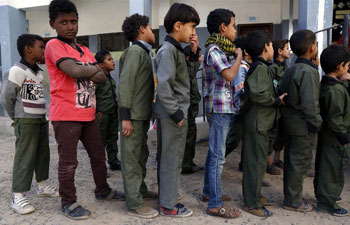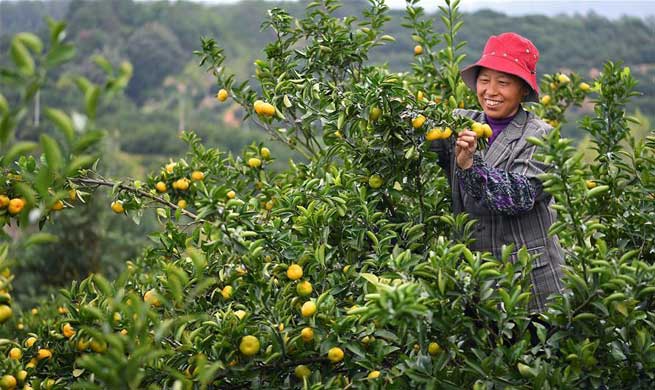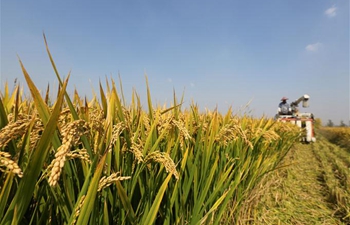NAIROBI, Oct. 11 (Xinhua) -- Kenya's Beatrice Ndunge spends between 32 and 40 U.S. dollars every week to feed her family of four.
In a good week like when her mother sends her traditional vegetables from the village, she spends 30 dollars.
This is almost 10 dollars more from what she used to spend a month ago. The bulk of this expenditure is on groceries, milk, electricity and water.
Ndunge settled in Kenya's capital of Nairobi in 2005 where she got her first job as a nurse after graduating from college.
A meticulous planner, Ndunge says every coin of her salary is planned for before it hits her bank account every other month.
Her family has expanded and so has her budget, all these changes over the years have been chronologically been documented in a black book she plans to use to educate her children on personal finance management.
"When you look at my black book, you notice how fast things change, how valueless the money you had yesterday can be today. I learnt to record down my personal finance journey since I was a little girl from my father who was a farmer in Nyahururu (an agricultural region which is located about 180 kilometers north west of Nairobi)", said Ndunge.
While Ndunge' s book speaks much about her prowess in financial management and the lessons she has learnt through the years, her father's 'black book' gives a totally different story.
The father religiously recorded his maize harvest year after year and the earnings made every respective year. His farm was his office and from it, he fed and educated all his eight children.
In this book lies a strong story on climate change that doesn't need an expert to explain.
A large scale maize farmer known for his prowess in farming in that area, Jackson Ndunge says he kept his farming records to keep track of his enterprise like any other businessman would do, only that these records now tell a totally different story.
A decade ago, Ndunge could harvest over 100 tons of maize from his 30 acre piece of land but this has been changing over the years. In 2017, he managed 48 tons which was a great improvement from the previous year.
"This year (2018) there might also be a slight improvement but I miss the good old days when you were almost certain of your harvest. Climate change has hit us hard and things get worse by the day. I thank God my children are now all grown and working, the little I make from my farm is for my needs which aren't that much," he told Xinhua during a recent interview.
Ndunge's story is a reflection of how hard climate change has hit Kenyan farmers who are heavily dependent on rainfall.
To an ordinary Kenyan farmer, the science behind climate change is hard to explain but the effects are slowly hitting home. Most of them can no longer depend on their farms for livelihood as yields have continued to dwindle year after year.
This can only get worse as the world's leading climate scientists have issued their most extensive warning yet on the risks associated with increasing global temperatures.
The authors of The Special Report on Global Warming of 1.5°, approved last Saturday in Incheon, South Korea, by the Intergovernmental Panel on Climate Change (IPCC), say that urgent, far-reaching and unprecedented actions are needed across society, in order to limit warming to a maximum of 1.5°C above pre-industrial levels.
Exceeding this target by even half a degree significantly increases the risk of flooding, droughts, extreme heat and poverty for millions of people around the world.
According to the report, the world is already 1°C warmer than pre-industrial levels and it makes clear that the effects of climate change are already apparent through record droughts, fires and devastating hurricanes that have become all-too-familiar in recent years.
It said that limiting warming to 1.5°C compared to 2°C, may reduce the proportion of the global population exposed to water stress by 50 per cent, although this projection varies considerably by region.
Half a degree of extra warming is estimated to bring an additional 10 cm sea level rise, which would affect 10 million more people by 2100, particularly those residing in low-lying areas as well as putting additional pressure on coastlines.
Rising temperatures also increases the risk of vector-borne diseases, such as malaria and dengue fever, as warming shifts their geographical range.
The authors predict that insects, essential for the pollination of plants and crops are nearly twice likely to lose half their habitat at 2°C than 1.5°C.
The report shows that large-scale carbon dioxide removal strategies will be necessary and it stresses the need for greater forest protection and reforestation schemes, carbon offsetting initiatives and direct air carbon capture and storage.
The authors acknowledged that some progress has been made, particularly with regards to the adoption of renewable energy. In 2017, Scotland met 68.1 percent of its energy needs through renewable sources.
China and India are also making significant investments in renewable energy, having both recently increased their renewables targets.
The report says that crucial policies to reduce global warming must be in place by 2030 to avoid the worst. If emissions continue at the current rate, 1.5 degrees of warming could be reached between 2030 and 2052, and temperatures would continue to rise steeply.













